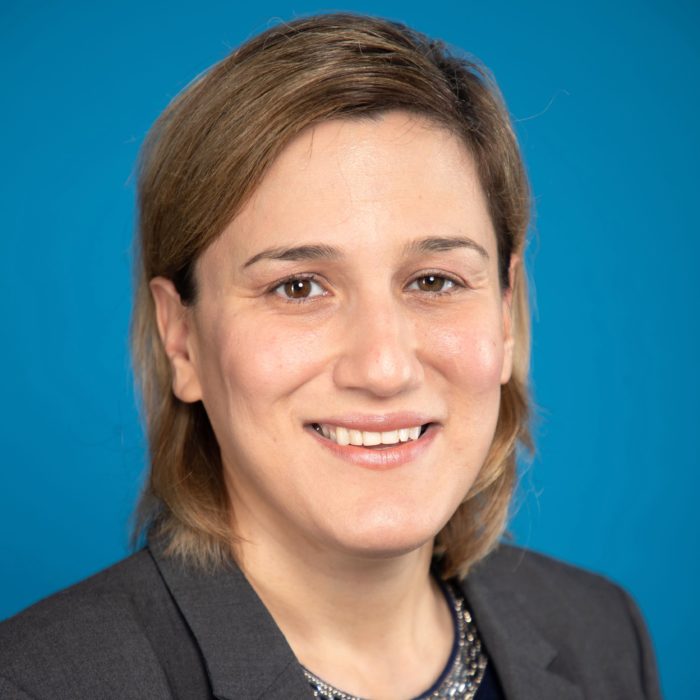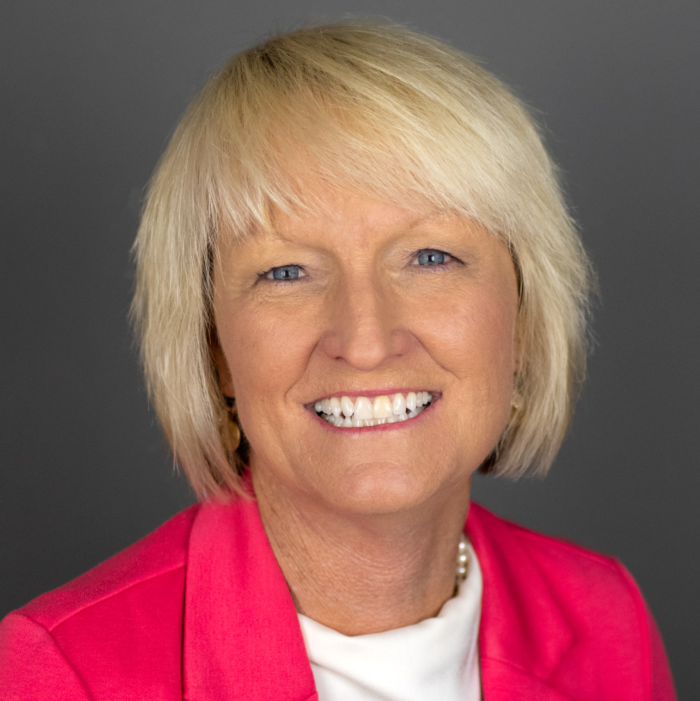Equity and community were the key drivers of the latest strategic plan developed by Ferndale Schools, a multicultural and multilingual district in Detroit’s suburbs. During the planning meetings, Superintendent Dania Bazzi said she, her administrators and school board members sat in the back of the room and didn’t speak.

“We just listened,” says Bazzi, Michigan’s 2022 superintendent of the year. “This allowed our community to fully drive the process and provide us with a plan that they were passionate about. This also leads to the community holding the board and administrators accountable, which greatly increases the chances of success.”
She plans to duplicate this community-driven work when she takes her new role next fall as superintendent of the West Bloomfield School District, a little farther outside Detroit. “Having the community leading this process is vital to its ultimate success,” Bazzi says. “So my main priority to start will be to listen, learn, and formulate authentic relationships with all stakeholders.”
This work, of course, is geared toward expanding opportunities for students. Here’s a closer look at how Bazzi and two other “superintendents to watch” are designing a richer curriculum for their students.
Honoring equity
Graduates of Ferndale Schools have told administrators that hearing their classmates’ perspectives and exploring the range of human experiences was one of the keys to their success. This is one reason that social-emotional learning, rooted in a “whole child” philosophy, has been a priority for Bazzi during her time at Ferndale Schools. “Serving this diverse student body means adapting our educational model to a spectrum of students with different ways of engaging in learning, different levels of academic performance, and different motivations for behaving positively,” Bazzi says. “It starts with a recognition that learning is about more than reading, writing, and arithmetic.”
Ferndale’s equity work is based on establishing a culture of high expectations for all teachers and students and ensuring that district policy matches expected values and its values—such as reducing implicit bias. Bazzi has emphasized giving students of color and low-income students equitable access to academically rigorous Advanced Placement and honors classes.
Superintendents Summit
The District Administration Superintendents Summit offers cutting-edge professional development to school district superintendents and other senior education executives to inspire innovation and leadership excellence in K-12 education. Upcoming events in this series:
Jul 20 – Jul 22: Grand Geneva Resort & Spa, Lake Geneva, WI
Nov 9 – Nov 11: Omni La Costa Resort & Spa, Carlsbad, CA
Dec 14 – Dec 16: Ponte Vedra Inn & Club, Ponte Vedra, FL
Working with the nonprofit Equal Opportunity Schools, Ferndale Schools is enrolling a more diverse group of students in honors and AP and providing them with additional academic support. Teachers are receiving explicit anti-bias training as well as professional development in culturally responsive teaching and inclusive practices. Since the 2019-20 school year, Black student enrollment in at least one AP course grew from 31% to 44% of the total participants, Bazzi says.
At the state level, Michigan Gov. Gretchen Whitmer has prioritized teacher retention, a show of support that should help turn the tide on the staff shortages now plaguing districts in the state and across the country, Bazzi says. “Kids have been through a lot, but so have the adults,” she adds. “You have to balance allowing people the space they need to thrive in an uncertain environment with the sense of urgency required to get our students back on track academically.”
‘Better off being in school’

Students at Anderson School District 3 in South Carolina have been learning in person since the beginning of the 2020-21 school year. This was accomplished through social distancing, a rigorous cleaning regimen and consistent communication with parents, who wanted classrooms to remain open, Superintendent Kathy Hipp says.
Hipp, South Carolina’s 2022 superintendent of the year, also hired 15 more teachers to reduce class sizes at her five schools and provide more robust intervention to help students recover from academic losses caused by the pandemic. “The thing our student lost in distance learning is socialization and being around people,” Hipp says.”Mentally and social-emotionally, our students have been better off being in school around friends and face-t0-face with teachers.”
In recent years, the district helped get a countywide sales tax increase passed so it could partner with two neighboring school systems to build a career center. Her students now have access to about 20 new CTE programs, including biomedical and veterinary sciences, mechatronics, aerospace, computer programming and cosmetology. “On our own, we could not offer the choices students needed or some of the depth some the industries around us needed,” she says.
Among the key challenges ahead is helping students bounce back from the social-emotional trauma of the pandemic and upgrading some of the district’s aging facilities. She also wants to expand the number of AP classes her high school offers and help educators embrace technology as a true teaching tool. “I don’t want Chromebooks to be something kids just type notes on,” she says. “I want technology to be truly interactive so it takes students to deeper depths of knowledge.”
More from DA: 5 keys to building an online elementary school where students will thrive
She also plans to continue training leaders from within through collaboration on decision-making and the district’s assistant principal academy. “Every time we have a vacancy, my goal is to have an in-house person who’s ready to step into a leadership role,” Hipp says. “My philosophy is if you’re a servant leader, you’re always preparing your next generation.”
Sustaining silver linings

Providing “big school” opportunities in a small district has been key to Superintendent Randy Squier’s mission in Coxsackie-Athens Central School District in near Albany, New York. Students can now choose from eight AP classes and 29 college courses, which is allowing an increasing number of students to graduate as college sophomores.
Those students have also been empowered to self-monitor their own growth. College-career-life readiness indicators populate a dashboard that lets students track grade-point averages, attendance, career exploration activities and college-level courses taken, among other benchmarks, Superintendent Randy Squier says.
“We’ve taken away generic comments from report cards,” Squier says. “Now teachers are reporting out on whether they’re seeing students demonstrate good communication, collaboration, self-direction and critical thinking. We think those are better indicators of success.”
Over the last few years, the district has also been working to more accurately measure the effectiveness of its social-emotional learning efforts. Through his participation in the Lighthouse School Systems—a network of innovative districts facilitated by AASA, The School Superintendents Association—Squier has learned from other leaders how to use surveys more effectively, what questions to ask, and how to leverage the data. “That’s a hurdle we’ve finally gotten over,” Squier says. “It’s like an Appleby’s menu—there are a lot of ways to try to measure SEL. We’ve just got to dive in and do the work, try a measurement and stick with it, tweak as we go, and not worry about being perfect.”
Squier is also particularly proud of his team’s response to COVID. Students and teachers are now making more purposeful use of technology as coding is now taught in grades K-8 and high school students have access to CNC machines and other cutting-edge manufacturing equipment. Educators have also cut some of the “fluff” out of the curriculum to focus more closely on what’s essential for students to learn. This has also resulted in a sharp increase in project-based and interdisciplinary learning, Squier says.
Teachers and staff have also been even more supportive of students by channeling their own interests—such as esports, hiking, knitting, and chess—into sponsoring after-school clubs. During remote learning, every student received a check-in call from a staff member at last once a week. District staff has been working to continue that outreach in person since schools reopened, Squier says. “There are a lot of silver linings coming out of the COVID pandemic,” he says. “Now we have to sustain those silver linings.”









